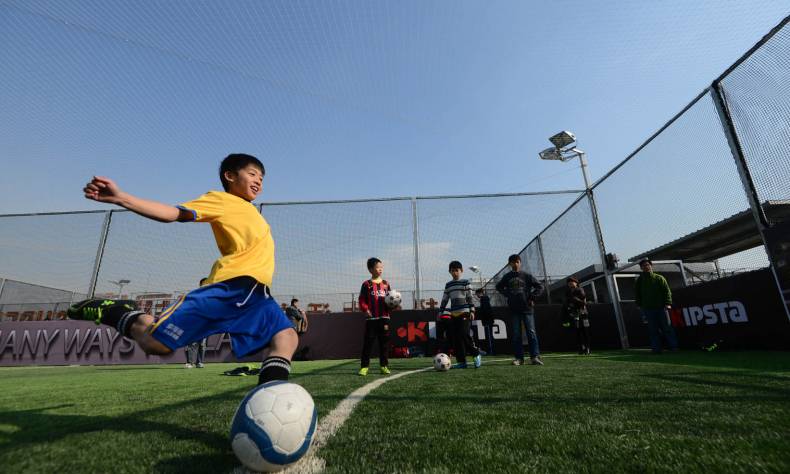
Football, starting from kids
The chief of Chinese Football Association (CFA), Cai Zhenhua, laid out a long-term plan for China’s national football team. The plan was drawn up at the CFA’s national congress over the 16-18th of December in Kunming. Over the next five years, the team should strive to qualify ofr the World Cup, reach the 16th round and also become one of the top 30 best national teams.
However the quite ordinary conference has attracted a great amount of nationwide attention and sparked heated debates on whether the goal is ambitious enough for the national team, given that it is now ranked 84th in the world. The argument boils down to the state of China’s national team – or more specifically the state of the men’s team.
A quick reminder of the team’s history can explain everything.
Since its first attempt in 1957, China national team has had 10 World Cup-qualifying campaigns but only succeeded once in 2002. Sadly, the then national squad failed to score any goal and lost all three games.
The national team lost to Thailand 2-0 and failed to make it to the last eight at the Asian Games last year.
Hong Kong and China reached a tie in a qualifying game last month for World Cup 2018 as both sides were unable to score a goal. The national team missed out on qualifying to compete in the 2018 World Cup.
Seen by many as a great disappointment, the men’s team have become the butt of many jokes. Some street vendors selling ‘chou doufu’ (stinking tofu) even call their commodity “Guo Zu”(national team). It would appear that the men’s team stinks.
So it’s understandable that CFA sets its mind on changing China football’s dire situation by making an Overall Plan of Chinese Soccer Reform and Development.
Before scrutinizing CFA’s reform from the top, let’s first look at what our neighbor Japan has done to improve their national team’s performance.
All the Japanese primary schools provide football classes, and they hold matches of various levels nationwide. For instance, there are almost 8000 teams of 12-year children in Japan, with almost 100,000 students of an age group participating in the matches. Besides, the student players’ parents and friends go to watch the games with almost the same enthusiasm as if watching World Cup, and the matches are even broadcast live.
Japan built a pyramid system, channeling primary and secondary school leagues to university leagues and then into professional divisions. Thanks to the system, Japan now has more than 800,000 under-18 players registered, according to CFA figures.
In sharp contrast, China has roughly 7000 registered youth football players. China’s youth training structure relies on the reserve training systems of 16 top-league professional clubs under CFA, with talent rarely being drafted from campuses. To add insult to injury, the number of Chinese student players has shrunk significantly due to various reasons including corruption scandals amongst Chinese football scene.
Besides, Chinese students normally have little time for enjoying sports, since they are under a huge academic pressure due to China’s exam-oriented education system. Marcello Lippi, a renowned Italian coach, says in a recent interview with La Gazzetta dello Sport, an Italian newspaper, that he was shocked to see few Chinese teenagers playing football in schools.
“If kids don’t play soccer in schools, the game will have no future in our country,” said Jin Zhiyang, a renowned youth-soccer coach who guided the Beijing Institute of Technology’s squad to numerous championships in the Chinese collegiate league. “Developing mass-popularity team sports such as soccer and basketball requires a comprehensive pyramid system, consisting of a wide base of school sports, a solid multilevel league system, and elite national programs on top of that. At present, we are missing a lot at the bottom,” he added.
Instead nurturing our own young talent, China has spent heavily on hiring foreign coaches and importing foreign players. If a foreign coach failed to save China’s football, simply, he could quite get fired and replaced by someone else. This short-sighted and convenient —but costly—solution may guarantee instant success and improvement, but in a long run, China’s team may probably continue to stink.
A decline at a national level should come at no surprise. Even if the Overall Plan set up a three-step strategy, and takes firm grip on CFA’s inner reform, as well as strikes on corruptions and soccer fraud.
Why has the world’s most populous country and fastest growing economy not selected eleven elite football players good enough for the World Cup? The answer lies at public participation and campus programs.
 Facebook
Facebook
 Twitter
Twitter
 Linkedin
Linkedin
 Google +
Google +



